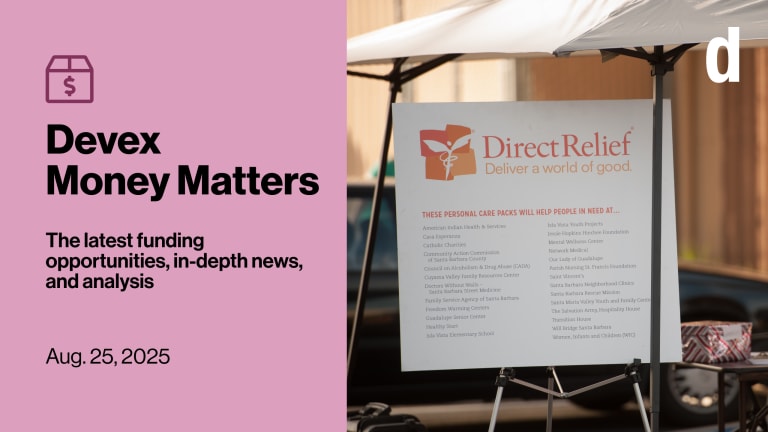What Ford’s $2B trust-based initiative can teach fundraisers today
As ODA budgets shrink and funders shift, the Ford Foundation’s BUILD initiative shows what long-term, flexible support looks like in practice — and what fundraisers can learn from it to strengthen their organizations.
As government funding dries up, one philanthropic initiative is in it for the long haul, showing what it takes to build trust — and organizational resilience. In a recent Devex Pro Funding conversation, Victoria Dunning, director of the Ford Foundation’s BUILD initiative, shared lessons from nearly a decade of investing in institutions rather than projects — and why this model may be more relevant than ever. A $2B shift away from project-based giving Launched in 2016, the Ford Foundation’s BUILD initiative — a 12-year, $2 billion commitment — offers a stark contrast to traditional grantmaking. It provides flexible, long-term support aimed at strengthening civil society institutions globally. Predating the now-popular trust-based philanthropy trend, BUILD offers five years of flexible, unrestricted funding designed to reinforce organizations from within — a model Dunning described as essential in today’s funding crisis. The motivation behind BUILD was practical. Ford Foundation President Darren Walker and Executive Vice President Hilary Pennington, both former nonprofit leaders, recognized the effects of what Dunning called the “nonprofit starvation cycle.” Their internal review revealed the foundation was mostly offering two-year project grants, even to long-term partners — leading to a critical mismatch between what grantees needed and what funders were providing. What BUILD has achieved so far To date, BUILD has supported more than 500 organizations across 44 countries. Its impact, Dunning said, is visible in stronger strategy, greater financial resilience, and more robust organizational infrastructure among grantees. The flexibility of the model has helped organizations weather shocks — from the COVID-19 pandemic to major funding cuts — and allowed them to focus on long-term planning rather than short-term survival. Concerns around misuse of funds, often raised with unrestricted grants, have been “incredibly, incredibly rare,” Dunning emphasized. From initiative to institution-wide shift While BUILD grants account for roughly 40% of Ford’s overall grantmaking, their influence has reshaped the foundation’s broader approach. Since 2016, the share of Ford’s non-BUILD grants that are multiyear and flexible has risen dramatically, from 37% to nearly 80%. The foundation also increased its base indirect cost rate for project grants from 20% to 25% — meaning grantees receiving restricted funding can now allocate a larger share toward overhead costs such as human resources, rent, and IT. These changes reflect a foundation-wide move toward supporting organizational strength, not just program delivery — an attribute many business development professionals are watching closely as they reassess their funding strategies. Adapting to context — and shifting power Although the BUILD model is anchored in a standard five-year framework, it’s not one-size-fits-all. Dunning emphasized the importance of adapting the approach to legal, regulatory, and organizational realities in different regions. In some cases, grantees — especially those in the global south — initially struggled with the openness of a two-line budget — one for general support, one for institutional strengthening — after years of restrictive, itemized project funding. In such cases, BUILD teams worked closely with partners to make the transition. The broader push for trust-based giving BUILD isn’t just about what the Ford Foundation funds — it’s also about how the foundation influences the broader philanthropic landscape. From evaluation sharing to public speaking and peer mentoring, Ford uses BUILD as a platform to advocate for long-term, trust-based approaches. And while the current funding environment is rocky, Dunning sees no backtracking from peers: “I certainly don’t see a retrenchment. … I think we’ll only see more.” Positioning for flexible, long-term funding So how can an organization attract this kind of funding? Dunning was candid: Becoming a BUILD grantee isn’t something you can apply for. Grantees are nominated by Ford’s program teams from their existing partners. However, there are lessons for fundraisers hoping to secure similar types of support. Dunning emphasized that BUILD grantees are typically organizations with: • Clear mission alignment with the foundation’s strategies. • Strong leadership, governance, and compliance systems. • A track record of impact and transparency. • An ability to build candid, long-term relationships with funders. Dunning also encouraged organizations to be proactive in shaping how they’re funded. That could mean asking for more flexible terms on a current grant, requesting budget lines that offer more breathing room, or nudging a two-year commitment toward three. Even small shifts, she said, can free up capacity and reduce the relentless cycle of fundraising and reporting. She also advised organizations to point funders to models that work — whether that’s BUILD or other examples shared by the Trust-Based Philanthropy Project. Showing what’s possible can help funders move toward more equitable, sustainable support. What’s next? While the Ford Foundation’s budget is a “drop in the bucket” compared to large government funders, it did provide additional, time-limited “adaptation and … smoothing” funds to partners affected by significant funding cuts, Dunning said, emphasizing that this to help organizations adapt to the cuts, not to simply refill lost budgets. Looking ahead, BUILD’s current allocation runs through 2027, and its future will be decided by the Ford Foundation’s new president and board. However, Dunning believes the principles and practices of BUILD will be deeply embedded within the foundation’s “DNA”, making multiyear flexible support and institutional strengthening the norm, regardless of whether the “BUILD” brand name continues. And after nearly a decade of championing this shift, Dunning’s personal takeaway is a lesson in humility: “Know less and listen more.” It’s a reminder that sometimes, the biggest leap in funding practice starts with letting go of assumptions — and trusting grantees to lead. Want more briefings like this? Let us know — and stay tuned for upcoming live conversations here.
As government funding dries up, one philanthropic initiative is in it for the long haul, showing what it takes to build trust — and organizational resilience.
In a recent Devex Pro Funding conversation, Victoria Dunning, director of the Ford Foundation’s BUILD initiative, shared lessons from nearly a decade of investing in institutions rather than projects — and why this model may be more relevant than ever.
Launched in 2016, the Ford Foundation’s BUILD initiative — a 12-year, $2 billion commitment — offers a stark contrast to traditional grantmaking. It provides flexible, long-term support aimed at strengthening civil society institutions globally.
This story is forDevex Promembers
Unlock this story now with a 15-day free trial of Devex Pro.
With a Devex Pro subscription you'll get access to deeper analysis and exclusive insights from our reporters and analysts.
Start my free trialRequest a group subscription Printing articles to share with others is a breach of our terms and conditions and copyright policy. Please use the sharing options on the left side of the article. Devex Pro members may share up to 10 articles per month using the Pro share tool ( ).
Raquel Alcega leads the data research and analysis at Devex, providing advice to organizations on the latest funding and programmatic trends that shape the global development space. She also heads up the news business content strategy and designs internal knowledge management processes. Prior to joining Devex’s Barcelona office, she worked in business development in Washington, D.C., and as a researcher in Russia and Mexico.








